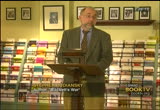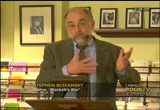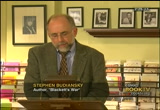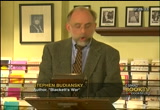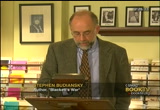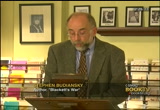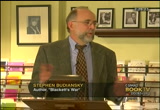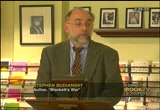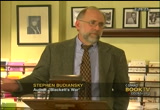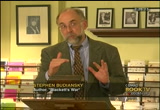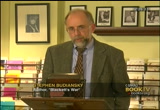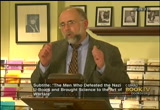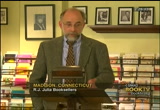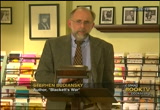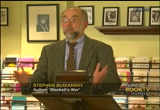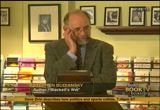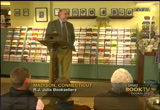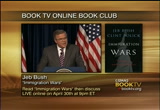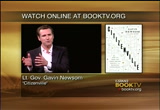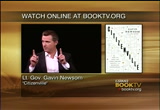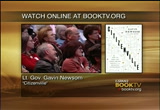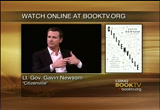tv Book TV CSPAN March 31, 2013 7:00pm-7:45pm EDT
7:00 pm
today almost as well known were the thousands of mathematicians and other scientific workers in england in washington d.c. who broke these chairmen in the for other access codes. the very small group of british and american scientists who really turned the tide in the battle against the u-boat are not so well known at all. ..
7:02 pm
never for one moment did we forget that everything happening elsewhere on land, sea, or in the air depended ultimately on its outcome. so home, in the spring of 1940 -- excuse me. thank you. so, in the spring of 1941 in the face of mounting losses churchill issued a somewhat totalitarian order that take the offensive, and it was and this
7:03 pm
dire crisis. given the job of putting together a small group scientists at britain's coastal command to see if they come up with some ways of improving their heretofore dismal performance in locating and attacking the submarines that were threatening britain's vital lifeline. blackett was at this time one of the world's most preeminent physicists. he had been unable to debt and saw action at the battle of jutland, and after the war the navy decided that all of these cadets commend cadets in age britain at that time certain age 14 and age 18 they graduated and then -- went into the navy's midshipmen, but the navy had to rush this last class right into
7:04 pm
war with the start of world war one. they thought, to make up for the loss and in charge of their education it would send them all to universities for six months to sort of round out their education. blackett was sent to cambridge, and within a few weeks of arriving there he said one there wonder door to the famous cavendish laboratory to see what a scientific laboratory was like very shortly after that he told the navy, leaving the navy. i want to become scientists. the work he did 1930's discovering the positron, the positive electron. be hands-on ability and the
7:05 pm
theoretical imaginations. he had never known anyone his equal in order to conceive a problem in physics camarena felines in mathematics, build an apparatus to himself, ikaria the experiment, and analyze the results. he is also one of a number scientists in britain and america who had been marking hard behind the scenes in the 1930's to prepare for war and to try to make sure that the army and navy made full use of science when it came. he was frustrated to know wind by what he found to be the typical attitude of military commanders which was done only that a bunch of civilian intellectuals cannot sell up to one or want to cover a war but more specifically that the only role scientists was produce a new gadget or weapon or gizmo and handed over to the military and then not concern themselves
7:06 pm
with anything. tactics and strategy and operations was a series of actions the use of the weapons and organization of the menu handle them where least as much scientific problem as the production. will we was arguing for would become the genesis of operational research. they thought it was an art. their role that the idea that experience intellectuals budding noses.
7:07 pm
per with the most dramatic was central calculation that scientists made showing the tactic -- tactics that navy had ordered air crews to use in attacking u-boat's even though it seemed like a perfectly sensible approach was in fact never going to successfully sink your boat. how much time at -- how much time elapsed between they spotted each other. endo was about 45 seconds that a you boat typically could be at
7:08 pm
the site by the time the airplane got in position to drop a depth charge. they figured a you vote could have gone down to one letter 50 feet below the surface. the trouble was once they started sifting through this a you will have time to take evasive action left to right. even though they were probably exploding at the right step on average there were almost always in the wrong place. fewer than 1 percent of all sites did it u-boats' were being successfully attacked. the scientists propose any -- an incredibly simple change.
7:09 pm
they said change the setting of the depth charges from 130 feet to 25 feet, only attack them after 15 seconds which would ensure that when they did carry an attack on the target would be both at the right depth and the right place because u-boat had f-15 second window and would not have time to take evasive action and zigzag. the scientists calculated this would increase the successful kill rate of 1% to 10%. this incredible knew wonder weapon known new weapon are gizmo. and sure enough when their
7:10 pm
results were implemented it was almost exactly a factor of ten. it took some convincing the results were undeniable. that change alone transformed the entire cost some tense formed the anti-submarine from a failure to a decisive battle. and by the summer it effectively knocked the boats out of the war ended toward the success the following year. repeatedly a similar group of scientists were established by the u.s. navy after america's entry into the war produced equally prodigious results
7:11 pm
doubling, tripling, or even more the effectiveness of existing weapons. through fairly simple analyses and just by asking the right questions about tactical and strategic decisions that had often just made by tradition rather than rigorous analysis the most powerful was the feedback of the envelope. they oversaw the convoys there were crossing the atlantic. a large map where they also were tracking what they believe were then known positions of the u-boat. and he knew what it was, then
7:12 pm
mostly travel on the surface. he was a will to figure out how many should have been spotted. when he compared them to the actual numbers that were being spotted there were only finding a third or fourth of what they seemed they're ought to be. all sorts of fanciful ideas were proposed that explained was going on, but the answer turned out to be very simple, yet overlooked. one day in air force officer asked, what color barco's a commander plans? it turned up most of them had been painted black.
7:13 pm
it is the worst possible cost -- color if you want to be seen the as to whether cloudy sides died in the north atlantic. repainting the other side of the wings white led to a doubling of the most -- u-boat sightings. the prime minister. prices and the airplanes. this produced the equivalent of affect by analysis and testing the right questions in a relatively simple change. now, blackett after the war took pains to emphasize it was not really the case of a bunch a brilliant scientists telling that military commanders how stupid they were, much has been
7:14 pm
sounded most of the time of most of the time it turned out the military was doing things successfully. by going back ted square when they turn of small points that had been overlooked. the mit physicist who headed the american anti-submarine research effort every juror all of the experiences. as brevard example, he said it was a trivial of what operation research would do. some rough conditions.
7:15 pm
soldiers waiting to watch. so being a good operations researchers he went up and timing what was going on. they had for washtubs. it took three times as long to wash. he finally said, if you had three times for washing and one for rinsing it will speed this up and not only did shrink but it vanished completely. if you can't find the bottle neck and remove it often it is a
7:16 pm
seemingly miraculous results. he managed to triple, not adding a single airplane, a single additional man to the ground crews that simply by looking at where the ball -- bottlenecks were routine operate -- minutes operations and what components broke most often and rearranging procedures and routines. one commander who was asked about his work was full of praise.
7:17 pm
marvelously efficient. of course it was the gentleman. it was an extraordinarily diverse group of men who made up the british and american anti-submarine operational research teams. physicists, mathematicians, insurance actuaries, zoologists, astronomers, botanists, and one expert on the sex life of the oyster as he was described by colleagues which was no exaggeration. he was the only one that i'm aware of who had any military background and all. what they share was a scientific mind set and no preconceived notions. it was also crucial that they were outside. they were not military professionals. they had no career on in where only the results mattered.
7:18 pm
blackett advise one of his colleagues to is offered a naval commission to return it down. being a civilian also meant that they could more easily talk to an associate with enlisted men who, as everyone in the military knows, really knows what is going on. one of the operational researchers recalled how he was hitting most of this affirmation by anyone in the parks where the of seals went which legends include 90% of operational research is here . the sociological aspects of what blackett and his american counterparts did every bit as fascinating as the technical and scientific details. it took an incredible amount of tac and understanding and
7:19 pm
bureaucratic politics on the part of blackett to obtain permission in the first place to be embedded with operational squadrons amount to be allowed not just to see second-hand data but for themselves how things worked into real test questions. blackett very shrewdly decided that his group was not going to stake its reputation by going tough fight for small are incremental improvements. it was going to require some complex scientific statistical analysis to prove that they had actually made things better, they were never going to persuade the admirals and generals. whether they had to concentrate on the things that produced results that were so dramatic that they could speak to themselves. changing the color of the camouflage and the depth charge
7:20 pm
settings. these are dramatic examples the really convinced initially this believing officers that the civilian intellectuals did have something to offer. likewise, they needed ted stifle the natural tendency of scientists who sit around gassing and intellectualizing about a problem for its own sake he told his colleagues that this was not at all the situation. their job was to improve things if they can and if not to keep quiet. on the american side he said arguably a more skilled understanding of bureaucracy in the military would be made an absolute rule that would require everyone read every single month , the same standing instruction. we have to be a will to get permission to go out and talk to the operational squadrons.
7:21 pm
we have to be able to talk to everyone to lead to get the facts but we cannot be seen as some sort of. [indiscernible] who will tell on and that they're doing something wrong and even more important the credit has to go to the commanding officer. the report to the commanding of sir. our job is to help win the war, not to run ourselves. i want to mention one other part -- point. i was not expecting that i will be riding the lefties.
7:22 pm
hard left marxists or even in the few cases literally communists. it turned out that there were several important reasons. it is interesting and important understand. most basic scientists until the 1920's are so were actually and a matter of principle not political and all. it would harm your objectivity and the attachment as a scientist. you should not. two things changed. one was the great depression. one of many scientists in the 1930's who was furiously
7:23 pm
frustrated between the incredible discovery there was that on the wrong hand. on the other hand was the miserable property of the working population. britain in a sense, the stock-market crash of the june june 29 and the great depression it did become a worldwide phenomenon, the continuation of the same slight that had been affecting the british economy says the first world war. they saw a situation in which the efforts of science and progress were not going to fit into society as a whole.
7:24 pm
they concluded that the rational organization of science and societies is the only way chase that. the terrible evils of not see germany beginning with the persecution of the dismissal of all jewish scientists from universities in 1953 blackett was involved as many people were in finding positions for refuge the jewish scientists from germany at universities, but i think their politics was far less important. the brilliance, the commitment, and they're true powerlessness. the scientists in britain and america who would be involved
7:25 pm
including six past or future nobel prize winners. what they fundamentally showed was that even in something as uncertain and tradition-bound as war scientific thinking was crucial to victory. the official history of scientific contribution to the war effort observed that hitler had a romantic perception of war. hitler, as his generals or the official historians failed to produce any research. if they had they probably would have won the submarine campaign and the war. thank you very much. thank you for coming. i would be delighted to answer any questions. has been a pleasure. [applause]
7:26 pm
and if you do have questions please with the microphone so that we can get your question recorded. >> how did your research these topics given that most of it happened so long ago? >> was a very interesting await -- array of sources available. i went to london and spoke to some fascinating days looking at the papers of blackett, which the world society has perry public record office in london has a lot of the reports done by the anti-submarine operational research groups. a lot of memos. all the way up to churchill. it's interesting. churchill had a very strange relationship with science.
7:27 pm
he was very enthusiastic, which was wonderful and also got carried away with ideas of his which were a terrible waste of time, but i mentioned social importance and his work on aircraft maintenance. in the british archives there is this memo from churchill the same month that this work began fully aware of it, fully supporting it, mentioning i understand this will triple the amount of flying hours, please continue with the studies. very interesting. on the american side similarly the national archives here in washington has a lot of the reports. and a number of the signs, almost all of them. but in the 1970's, some of the professionals decided they had some oral histories.
7:28 pm
a few nice personal telling details. >> you mentioned one of the important aspects was that the scientific investigations are not part of the military. part of the lesson in this is that we forgot was our entire society. the most brilliant scientific minds, the most brilliant legal minds. people who had no interest in a career in the military and in some ways people who were almost the opposite of the kind of person who would even stand being able to have a military career, i don't mean that in a disparaging way.
7:29 pm
it would not have been the kind of thing that was part of their personality. brought into the war. there was a sense of urgency. there was a sense of breaking the rules when necessary, and improvisation. that was true certainly in the code ready effort as well. it was true in special operations and espionage. and i think on the one hand we can say it really is an accomplishment that scientific understanding is now a second nature in professional life which is good. we have lost something because the greatest minds in science are not in this world. the greatest legal minds, the greatest mathematical. and you have to keep these people under control. i'm not saying science as a solution to everything, but i
7:30 pm
think we have lost something that you have people who are part of the chain of command. and you saw them actually. i tried to follow through just a bit at the end of the book with what happened with the operation research. it was a great triumph and success and is now part of standard military thinking. in the fifties and early 60's in particular you saw lot of cases where the zero are researchers who are now often civilian but employees of the navy or army were giving the answers but generals and admirals weren't. so talking to bill odom who had been a director. it was right at the time before the wall fell and all kinds of
7:31 pm
new thinking about things. he said to you know, we ought to have the ceremony, run down the flag in front of the cia. we are abolishing the cia. start a completely new agency from scratch because he was boys toward the same thing. lost something. the bureaucracies have become lessons in themselves. >> how quickly after the war and it did operations research move into industry? >> very quickly. is interesting. fillmore who headed the u.s. antitrust of our effort very quickly decided that we would establish a program and mit. and by the mid-50s this had begun. they had students.
7:32 pm
they had founded the operations research society of america which was very much focused on civilian problems, you know, everything from schedule -- scheduling fire fighters, work ships, water flows, dams, problems managing bottlenecks, where houses, factories. these guys, i think, were keenly aware now of the large possibilities. and some of that was because of their politics. they thought, well, we proved what central planning and scientifically important central planning can do in the war, the victory against the u-boat. so we regard to have scientific socialism, organize industry. hiller's britain was trouble america. just like of interest. of course it did not work out that way. the civilian economy is vastly
7:33 pm
more complex than the problems of defeating u-boat's. the war against the u-boat's, everyone agreed on what the measure was, how many merchant ships you save in as many you sunk. when you're dealing with the economy, what is the measure of merit jacket depends on your political ideals. so those were much less successful, but certainly in terms of how they were disciplined but could be applied to problems in industry, very quickly. a follow-up here. >> i ask the question. when i get a college and went to work in the summer of 1953, when i was doing as a young engineer was operations research. we call the time and motions. >> you get into all of the low -- all of the terms.
7:34 pm
that went bike earlier. they tended to have a somewhat narrower focus. and the deal our guys were making plans for how much this approach should be applied, particularly when you got into things of analyzing or close through the factory and scheduling and analyzing where the bottlenecks were. that was -- and i think they were probably right. it was at least the concept of a much broader application. okay. yes. yes. and, look, the critique. there was this great demo from one annoyed british bureaucrat from around this time. we seem to be making this big deal of operations research. it just seems to be ordinary common sense sensible things that are given these fancy names . but i think, you know, just
7:35 pm
getting back to the anti-submarine story, world war ii, they really did something, i think, fundamentally new which was to say basic questions about military strategy, tactics, and operations are even a minimum to a scientific analysis. it had only been done piecemeal. it was a real revolution. >> i wonder if your research cam across. >> two is the? >> one of the most successful anti it simmering as in the british navy. >> but he was an officer. >> he was a maverick. some people wanted to sack him, but he actually produced a result.
7:36 pm
>> any other questions? well, thank you very much. [applause] >> for more information visit the of this website budiansky.com. >> the election is over. we have basically what we have before. other than the fact that we spend $4 billion to have our president be reelected, the senate remains in one party stands and the house remains an a republican sens. we have effectively gridlock. we have variations on these new terms like sequestered. the last week in washington they call this know that never came the snow-quester.
7:37 pm
things called the fiscal cliff which we thought that we would jump off of and i now runs the inability that come to compromise. nothing in the election change that. because of the way that nation is divided the direction we should take is undecided. meanwhile, the power of compounding is not our friend. recovery is the weakest as has been in modern times. our entitlement programs, everyone recognizes there are unsustainable, literally unsustainable and growing magnitude without change. regulations are outdated, complex, costly, and certainly creating way too much uncertainty. education system does not help enough and people in the power of knowledge to pursue dreams as they see fit. our debt levels are way too high and rising rather than declining . our tax policy is way too complicated and it punishes savings and success. our social and economic mobility, something they used to
7:38 pm
define america, something that we have been propped up a legitimate reasons irrespective of where you start effuse work are employed by the rules you can achieve great things has diminished. a mocks the developed countries of the world we are least economically mobile. our country has changed and our political system which is so important for us to begin to break through is not capable of being a will to solve these problems. >> a you interested in being a part of the new online book club? we are discussing immigration -- "immigration wars". jeb bush was recently on book tv presenting "immigration wars." you can once the program on line at booktv.org. as you read the book this month poster thoughts on twitter. right on our facebook page. facebook.com/booktv. on april 30th at 9:00 p.m.
7:39 pm
eastern join our live moderated discussion on both social media sites. have an idea for next month? send your suggestions on which books you think we should include via twitter, facebook, or e-mail us. book tv at c-span.org. >> the old adage, you want to move the mass, you have to move the chief. if you want to change behavior you have to change. there has never been strong initiatives for focusing. it is not on any of us that the lascar people that are going to come and advocate in a budget crisis, technology over health care or over programs for seniors. these don't exist. they don't lineup. we're stickers. coming down the city all a state government demanding more information technology. and so that it -- the challenge
7:40 pm
is to realize its potential and possibility. the department of motor vehicles just gave up on a six year effort to update its 40 year-old technology for the issuances of licenses. yes been more than half the money and it is our living close to have we done. they just ended the contract. is it a surprise to any of you? talk about scandal and government. the court system in california in 2004 identified a $260 million upgrade that was to be complete in 2008. today the estimate is one. $9 billion to connect 58
7:41 pm
counties and their case management system with no expectation inside that it will be done before 2000 and 15. the payroll upgrades in california, contracts, the contractor was also just fired and get less attention a week ago and that dmv. consolidating 49 days centers into one. everyone now is more upset with the consolidation and there were previously. we fixate on something that all of you know. i would argue there was corruption by those that serviced that industry but not serviced it well. it's not a surprise.
7:42 pm
>> did not even know the money was there. it went underground. >> it deserved a lot of attention, but think about all these other examples. and i can go on and on. those are just temporary truce. >> you're saying government is now working as a should be? >> not focused on us. >> so where did this citizens come in? >> increasingly, there is this new change. less and less. five years ago we were talking about free wi-fi and the importance of dealing with social and economic issues. increasingly that is beginning to take shape with the cost of these devices dropping precipitously, not only as it relates to access and america, but you see the access around the rest of the world,
7:43 pm
63 percent of people in india have access. only 47 percent have access. a world remarkably where we are becoming more and more wireless. but with government, this divide continues to get wider and wider and wider. your world of amazon. you can shop 24 hours a day and then you go to the dmv. you go down to your local building department. you go ending date to pay a parking ticket and you realize. so much here is this. citizens are now more engaged peer to peer, more engaged directly as we move through a framework of not just social networks but mobility, localization of services and the access and ubiquity of the cloud. we are stuck with this old top down 90 cartel mine said. i say it lovingly. this notion that we can build these systems and servers in the
7:44 pm
world are now you have this on demand resources and you always did in that next iteration. you're renting in not even buying. we are still building in government. >> it is no longer relevant. >> they say will transform everything. you talk about engagement of citizen to citizen, we're talking about virtual engagement >> engagements. i'm kind of fed up with local government, state government. i'm sick and tired of hearing some haggling around -- i don't even know what that is. sequestration. and disconnected. i want to solve problems. i want to engage. i want to make a difference. particularly this in regeneration, the generation of
92 Views
IN COLLECTIONS
CSPAN2 Television Archive
Television Archive  Television Archive News Search Service
Television Archive News Search Service 
Uploaded by TV Archive on

 Live Music Archive
Live Music Archive Librivox Free Audio
Librivox Free Audio Metropolitan Museum
Metropolitan Museum Cleveland Museum of Art
Cleveland Museum of Art Internet Arcade
Internet Arcade Console Living Room
Console Living Room Books to Borrow
Books to Borrow Open Library
Open Library TV News
TV News Understanding 9/11
Understanding 9/11

